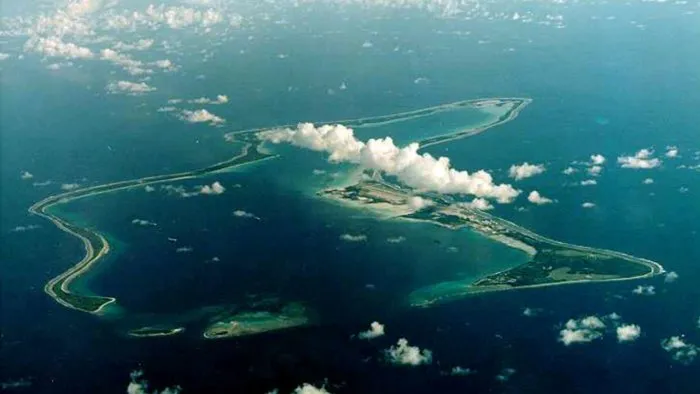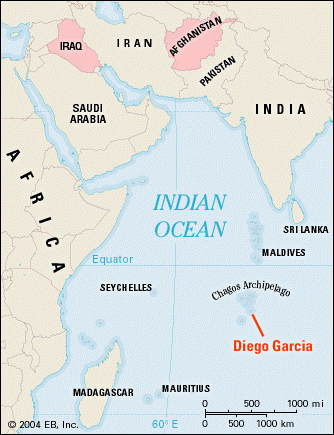
The dispute between Mauritius and the United Kingdom (UK) over the Chagos archipelago in the Indian Ocean has been ongoing for several decades. Disparagingly referred to as ‘
Britain’s Last Colony in Africa’, the dispute over Chagos Islands raises several important questions, not just of sovereignty, but larger questions of decolonisation, international law, securitisation, human rights, and justice.
Mauritian Prime Minister
Pravind Jugnauth, in the 2023 New Year’s address, noted that Mauritius and UK have entered into talks over the sovereignty of the Chagos archipelago, adding that he found the latest developments very encouraging. Following this, in February, Jugnauth had a telephone conversation with British Prime Minister Rishi Sunak. It was
reported that Sunak welcomed opportunities “to work even more closely together” on tackling regional and global security challenges. The two also discussed the ongoing negotiations over the Chagos Islands dispute. At last, is Mauritius’ fight for sovereignty over the Chagos archipelago drawing to a close?
 Source: Britannica Encyclopaedia, Britannica.com
Source: Britannica Encyclopaedia, Britannica.com
Who controls the Chagos Islands?
The Chagos archipelago comprises around 58 small, very low-lying islands in the middle of the Indian Ocean, their number varying with tidal height and shifting sand banks. Since the 18
th century, they have been under colonial occupation, briefly by the Dutch and then under the French. During this time, the native vegetation was converted to coconut plantations. Present-day Chagossians are predominantly descendants of indentured labourers who were brought onto the then-uninhabited islands to work on the plantations. When the Treaty of Paris was signed in 1814 (which ended the Napoleonic Wars), Mauritius, along with some other French colonies such as Tobago and Saint Lucia, were ceded to Britain. Mauritius remained a British colony until independence in 1968.
However, during colonisation, the Chagos Islands were treated
as a dependency of Mauritius. The current dispute can thus be traced back to the detachment of the archipelago from Mauritius in 1965 and the creation of the British Indian Ocean Territory (BIOT).
Secret talks had been ongoing between the governments of the US and the UK over the possibility of creating a military base on one of the British-owned islands in the Indian Ocean in the years prior to Mauritius attaining independence. Against the backdrop of decolonisation, the British withdrawal from east of the Suez, the growth of the Non-Alignment Movement, and increasing tensions due to the Cold War, the US was toying with the possibility of establishing a military base in the Indian Ocean.
The US requirements for the base were that it be strategically located, have the potential to become a listening and communications station, yet at the same time be relatively secluded, ideally uninhabited and with limited access to the island.
The US requirements for the base were that it be strategically located, have the potential to become a listening and communications station, yet at the same time be relatively secluded, ideally uninhabited and with limited access to the island. Since Diego Garcia, which is a part of the Chagos islands, fit these requirements, it was supposed that the local population could easily be moved with compensation.
At the end of the talks, it was agreed that the UK “should be responsible for acquiring land, resettling the population, and providing compensation at the United Kingdom Government’s expense; that the Government of the United States would be responsible for construction and maintenance costs.” It was also agreed that the UK Government, “would assess quickly the feasibility of the transfer of the administration of Diego Garcia and the other islands of the Chagos Archipelago from Mauritius.”
 Source: The World Factbook, cia.gov
Source: The World Factbook, cia.gov
Detachment of the Chagos archipelago 1965
A
UK Foreign Office memorandum from that time shows that the British believed detaching the Chagos archipelago from Mauritius prior to its independence and placing it directly under the UK administration would best satisfy both UK and US interests in the Indian Ocean. The same document noted that doing so without the consent of Mauritius would invite criticism from the United Nations.
Phillipe Sands (HR Lawyer & Counsel for Mauritius) in his book
The Last Colony details the pressure tactics used during negotiations between UK and Mauritian representatives. When British Prime Minister Harold Wilson met Mauritian Premier Sir Seewoosagur Ramgoolam, a briefing paper prepared for Wilson suggested that, “The object is to frighten him with hope: Hope that he might get independence; Fright lest he might not unless he is sensible about the detachment of the Chagos Archipelago.” The brief went on to say, “The Prime Minister may therefore wish to make some oblique reference to the fact that H.M.G. have the legal right to detach Chagos by Order-in-Council, without Mauritius consent but this would be a grave step.”
When Mauritius became independent in 1968, the UK retained control over the Chagos archipelago having managed to come to an agreement in 1965 with Mauritian representatives, three years prior to independence. Known as the Lancaster House Agreement, it included
assurances that, “compensation totalling up to 3 million pounds should be paid to the Mauritius Government over and above direct compensation to landowners and the cost of resettling others affected in the Chagos Islands”. The validity of this agreement has since been questioned with Mauritius claiming it was signed under duress; and
the advisory opinion of the International Court of Justice (ICJ) found that “At the time, Mauritius representatives did not have genuine legislative or executive power, and it is thus impossible to speak of an international agreement, as the archipelago’s detachment was not based on the free and genuine expression of the people of Mauritius.”
Over the years, the UK government has faced several court cases contesting its sovereignty claims over the Chagos archipelago and the treatment of its inhabitants. Some of these cases have been between the governments of the two nations, but there has also been litigation by Chagossians seeking their right to return. This issue has been going around in British courts for several years including the Divisional Court in 2000, the Court of Appeal in 2006, and in the House of Lords in 2008. It was also brought to the European Court of Human Rights in 2012; International Tribunal for the Law of the Sea (ITLOS) in 2015; ICJ in 2018; and United Nations General Assembly (UNGA), most recently, in 2019. In actuality, Mauritius has been contesting British sovereignty over the archipelago since the 1980s.
A shift in UK policy
For decades, UK pushed back against Mauritius’ claims of sovereignty over the Chagos group, and the Chagossians’ desire to return to the archipelago. While expressing regret over the manner in which the Chagossians were forcibly removed from the islands, the British government has consistently maintained that White Hall’s sovereignty over the Chagos Islands traces back to the Treaty of Paris 1814. They have blocked the Chagossians’ attempts to return to the islands, changing strategies, and citing various reasons over the years, including on the grounds of feasibility, cost to the British taxpayers, claims of it being a marine protected area, defence and security reasons, and thereby, allowing only heritage visits to the islands.
The Chagos Islands dispute is a multi-layered, complex, poignant and as yet unfinished story—touching on issues of human rights, justice, the role of international law and legal forums as well as sovereignty, territorial integrity, and the proper completion of decolonisation.
Today, there is a perceptible shift in UK policy, reflecting the declining influence of UK soft-power amidst the unravelling of a more violent chronicle of British imperial history and a wave of
anti-colonial fervour in former British colonies such as Barbados. When it suffered arguably its most crushing defeat at UNGA in 2019, with many of its allies voting against its interests and an overwhelming majority supporting Mauritius, the UK, perhaps, read the writing on the wall. Though the UK has always pointed out that the views of the ICJ and UNGA are non-binding, in a post-Brexit world order, its government recognises that a narrative in which they are perceived as standing against the UN, ICJ, and the international community at large and more crucially contending with international law and a rules-based order is problematic and undesirable.
The Chagos Islands dispute is a multi-layered, complex, poignant and as yet unfinished story—touching on issues of human rights, justice, the role of international law and legal forums as well as sovereignty, territorial integrity, and the proper completion of decolonisation. There are two major plots to this story—the detachment of the Chagos archipelago from Mauritius and the subsequent removal of the Chagossians from the islands. The first has led to a battle for sovereignty between two governments while the second is an injustice carried out on a population. Both moves were motivated by the desire to establish a UK/US military base on Diego Garcia. While sovereignty talks between the UK and Mauritius are ongoing with the UK promising to
resolve all outstanding issues. But given the strategic importance of Diego Garcia, it is unclear if the Chagossians will be allowed to return even if Mauritius wins its sovereignty claims. Despite the successive court victories for Mauritius, the ground realities have, so far, not changed.
Dr Vinitha Revi is an Independent Scholar associated with ORF-Chennai
The views expressed above belong to the author(s). ORF research and analyses now available on Telegram! Click here to access our curated content — blogs, longforms and interviews.



 The dispute between Mauritius and the United Kingdom (UK) over the Chagos archipelago in the Indian Ocean has been ongoing for several decades. Disparagingly referred to as ‘
The dispute between Mauritius and the United Kingdom (UK) over the Chagos archipelago in the Indian Ocean has been ongoing for several decades. Disparagingly referred to as ‘

 PREV
PREV


